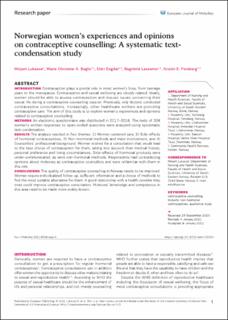Norwegian women's experiences and opinions on contraceptive counselling: A systematic textcondensation study
Lukasse, Mirjam; Baglo, Marie Christine G.; Engdal, Eldri; Lassemo, Ragnhild; Forsberg, Kristin Evelina
Peer reviewed, Journal article
Published version
Permanent lenke
https://hdl.handle.net/11250/2824415Utgivelsesdato
2021Metadata
Vis full innførselSamlinger
Originalversjon
Lukasse, M., Baglo, M. C. G., Engdal, E., Lassemo, R., & Forsberg, K. E. (2021). Norwegian women’s experiences and opinions on contraceptive counselling: A systematic textcondensation study. European Journal of Midwifery, 5(February), 1-8. https://doi.org/10.18332/ejm/132224Sammendrag
Introduction: Contraception plays a pivotal role in most women’s lives, from teenage years to the menopause. Contraception and sexual wellbeing are closely related. Ideally, women should be able to access contraception and discuss issues concerning their sexual life during a contraceptive counselling session. Previously, only doctors conducted contraceptive consultations. Increasingly, other healthcare workers are providing contraceptive care. The aim of this study is to explore women’s experiences and opinions related to contraceptive counselling.
Methods: An electronic questionnaire was distributed in 2017–2018. The texts of 308 women’s written responses to open-ended questions were analyzed using systematic text-condensation.
Results: The analysis resulted in four themes: 1) Women-centered care, 2) Side-effects of hormonal contraceptives, 3) Non-hormonal methods and male involvement, and 4) Counsellors’ professional background. Women wished for a consultation that would lead to the best choice of contraception for them, taking into account their medical history, personal preference and living circumstances. Side-effects of hormonal products were under-communicated, as were non-hormonal methods. Respondents had contradicting opinions about midwives as contraceptive counsellors and were unfamiliar with them in this role.
Conclusions: The quality of contraceptive counselling in Norway needs to be improved. Women require individualized follow-up, sufficient information and a choice of methods to find the most suitable alternative for them. A good relationship with a health provider they trust could improve contraceptive consultation. Midwives’ knowledge and competence in this area need to be made more widely known.

